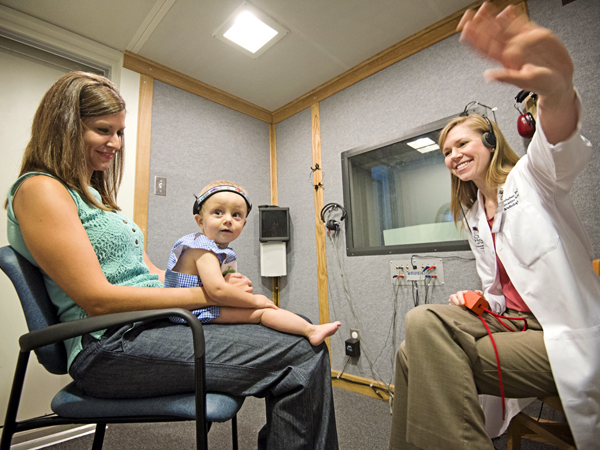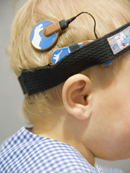New 'ears' for hearing-impaired son give Brandon family a jump-start

Instead of soaking in the sweetness of her newborn son, Marlee Weir was praying he would suffer only hearing loss.
That’s because sometime before birth, her son Reece became infected with cytomegalovirus (CMV). After a normal pregnancy, he was born severely jaundiced and covered in little purple spots. Marlee and her husband Casey were shaken, but the Brandon residents quickly learned there could be bigger problems ahead.
CMV is a common virus that causes mostly cold symptoms in healthy adults, but can cause a host of problems in babies infected in utero. According to the Centers for Disease Control, about 1 in 5 infants with a congenital CMV infection like Reece’s will suffer more permanent disabilities including developmental disabilities or hearing loss.
“I prayed a lot that day and the following days as we camped out in the neonatal intensive care unit that if something had to be wrong, for it to be hearing because I knew the technology available and knew that we could address hearing loss quickly,” she said.
Over the next two weeks, she began to think her prayers had been answered.
“I kind of had mother’s intuition that he was not hearing because he wouldn’t startle to loud noises,” Marlee said.
A few weeks after his birth, Reece had a hearing screening at the University of Mississippi Medical Center and her suspicion was confirmed – he had severe to profound hearing loss in both ears.
A 2010 graduate of UMMC’s School of Health Related Professions, Marlee Weir’s training as an occupational therapist kicked in. She knew learning during the first three years of a child’s life was crucial and immediately began researching Reece’s options.
“I know that the younger you start things with kids, the better the outcomes will be,” she said.

Dr. Jeffery Carron
Shortly after Reece failed his hearing test, she and Casey met with Dr. Jeff Carron, UMMC professor of otolaryngology and communicative sciences, about cochlear implants for Reece.
Cochlear implants have been around since the late 1980s but only became a widely-used option for children about a decade later.
According to Carron, they are still the best technology around. For people with profound hearing loss, he says it’s about the only option if the desire is to use listening and speech for communication.
It was certainly the only option the Weirs considered.
“We knew that we wanted to provide as many possibilities as we could for Reece, so there was never any real thought put into it, we knew,” Marlee said.
But simply making the decision to get cochlear implants doesn’t guarantee your child a place on Carron’s operating table according to both Carron and Marlee, who agree that the list of preliminary requirements in order to get implants is daunting.
“We screen everybody not just medically or anatomically but we also have to look at their level of commitment,” Carron said. “The implant is the first step in the process; it’s not the end of the road.”
Carron said what follows is extensive rehabilitation, follow-up and aggressive therapy.
“If someone’s not committed to that, unfortunately, implants may not help the child at all,” he said.
The Weirs were committed. Before Reece was even 6 months old, they had gone through the evaluation process and met with Carron for a pre-op visit.
“With Marlee’s background, we knew she would be very motivated and compliant and Reece would receive everything he needed to succeed afterwards,” Carron said.

Reece's new "ears"
At just six months old, Reece would be one of the youngest patient’s to receive cochlear implants in Mississippi – a fact that did not deter the Weirs or Carron in the least.
Carron said much of the current research agrees earlier is better.
“There is a limited window within the first 5-6 years where a child can learn how to talk and learn language,” Carron said. “After that, there’s very little language development. So, if a child’s not talking by 6, there really, literally is nothing we can do. That’s why we want to get to them earlier.”
Marlee knew the sooner Reece got implants, the sooner he could begin therapy. She hoped he would catch up developmentally and never know the difference.
“I just feel like, as a parent, it’s our job to provide opportunities to our kids so they can grow and develop to their maximum potential,” she said.
The Weirs also had complete confidence in Carron, she said. The day of Reece’s surgery, although they were anxious, they were more ready to “get over that hurdle” knowing the real work lay ahead.
Reece came through the operation with no problems and the implants were turned on two weeks later.
The Weirs know it will be slow process getting Reece to a comfortable hearing level, but said he’s doing great with his new “ears,” as they like to call them.
He will be in therapy for the next several years and will spend a great deal of time with UMMC’s team of audiologists, speech language pathologists and education specialists.
Carron noted that UMMC is the only place in the state with this comprehensive team of people to help patients before and after implantation and he believes it is the key to bringing these patients successfully into a listening and speaking world of communication.
Reece, now 1 ½, also attends Magnolia Speech School and the Weirs have worked his therapy into their daily lives. As Reece experiences little successes, like recognizing the sound of his own name, the Weirs are savoring some of the sweetness they missed out on during those first few days after birth.


